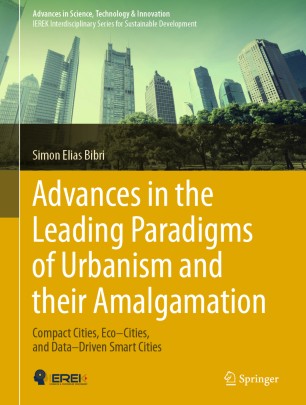

Most ebook files are in PDF format, so you can easily read them using various software such as Foxit Reader or directly on the Google Chrome browser.
Some ebook files are released by publishers in other formats such as .awz, .mobi, .epub, .fb2, etc. You may need to install specific software to read these formats on mobile/PC, such as Calibre.
Please read the tutorial at this link: https://ebookbell.com/faq
We offer FREE conversion to the popular formats you request; however, this may take some time. Therefore, right after payment, please email us, and we will try to provide the service as quickly as possible.
For some exceptional file formats or broken links (if any), please refrain from opening any disputes. Instead, email us first, and we will try to assist within a maximum of 6 hours.
EbookBell Team

0.0
0 reviewsThis book explores the recent advances in the leading paradigms of urbanism, namely compact cities, eco-cities, and data–driven smart cities, and the evolving approach to their amalgamation under the umbrella term of smart sustainable cities. It addresses these advances by investigating how and to what extent the strategies of compact cities and eco-cities and their merger have been enhanced and strengthened through new planning and development practices, and are being supported and leveraged by the applied solutions pertaining to data-driven smart cities. The ultimate goal is to advance sustainability and harness its synergistic effects on multiple scales. This entails developing and implementing more effective approaches to the balanced integration of the three dimensions of sustainability, as well as to producing combined effects of the strategies and solutions of the prevailing approaches to urbanism that are greater than the sum of their separate effects in terms of the tripartite value of sustainability.
Sustainable urban development is today seen as one of the keys towards unlocking the quest for a sustainable world. And the big data revolution is set to erupt in cities throughout the world, heralding an era where instrumentation, datafication, and computation are increasingly pervading the very fabric of cities and the spaces we live in thanks to the IoT. Big data and the IoT technologies are seen as powerful forces that have tremendous potential for advancing urban sustainability. Indeed, they are instigating a massive change in the way sustainable cities can tackle the kind of special conundrums, wicked problems, and significant challenges they inherently embody as complex systems. They offer a multitudinous array of innovative solutions and sophisticated approaches informed by groundbreaking research and data–driven science. As such, they are becoming essential to the functioning of sustainable cities. Besides, yet knowing to what extent we are making progress towards sustainable cities is problematic, adding to the fragmented, conflicting picture that arises of change on the ground in the face of the escalating rate and scale of urbanization and in the light of emerging ICT and its novel applications. In a nutshell, new circumstances require new responses.
This timely and multifaceted book is intended for a wide readership. As such, it will appeal to researchers, academics, urban scientists, urbanists, planners, designers, policy-makers, and futurists, as well as all readers interested in sustainable cities and their ongoing and future data-driven transformation.